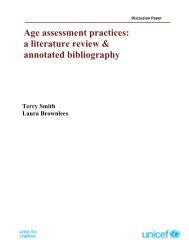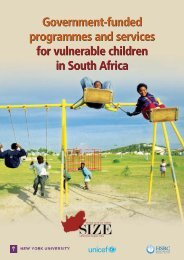Third and Fourth Periodic Report on CRC - Unicef
Third and Fourth Periodic Report on CRC - Unicef
Third and Fourth Periodic Report on CRC - Unicef
You also want an ePaper? Increase the reach of your titles
YUMPU automatically turns print PDFs into web optimized ePapers that Google loves.
C<strong>on</strong>venti<strong>on</strong> <strong>on</strong> the Rights of the Child<br />
SUBMISSIONS ON BEHALF OF THE CONDEMNED PRISONER/ APPELLANT<br />
Mr. Md. Abdul Jabbar, learned advocate appearing <strong>on</strong> behalf of the c<strong>on</strong>demned pris<strong>on</strong>er-appellant, submits that the<br />
accused was a minor at the time of his trial. In particular, he points to the order dated 22.1.2001 by which he was found to<br />
be below the age of 16 years. He submits that, therefore, he should have been tried by a Juvenile Court in accordance with<br />
the provisi<strong>on</strong>s of the Children Act, 1974. He submits that the Nari-o-Shishu Nirjatan Daman Tribunal neither had the<br />
jurisdicti<strong>on</strong> to try the accused as he was under the age of 16, nor could it transform itself to a Juvenile Court since the<br />
Tribunal is not empowered as such under secti<strong>on</strong> 4 of the Act. He submits that, therefore, the trial is illegal ab initio for lack<br />
of jurisdicti<strong>on</strong> of the Court to try the accused-appellant. He further submits that the trial Judge in his judgment has adverted<br />
to the earlier finding of the Sessi<strong>on</strong>s Judge in the order dated 22.1.2001 <str<strong>on</strong>g>and</str<strong>on</strong>g> has in fact reviewed that decisi<strong>on</strong> by which the<br />
age of the accused had been established. He submits that the prosecuti<strong>on</strong> did not appeal against that order <str<strong>on</strong>g>and</str<strong>on</strong>g> the trial<br />
Judge had no jurisdicti<strong>on</strong> to review the earlier order <str<strong>on</strong>g>and</str<strong>on</strong>g> finding of the Sessi<strong>on</strong>s Judge.<br />
With regard to the merit of the case, the learned advocate submits that there is no eyewitness to the occurrence <str<strong>on</strong>g>and</str<strong>on</strong>g> the<br />
<strong>on</strong>ly basis of the c<strong>on</strong>victi<strong>on</strong> is the so-called c<strong>on</strong>fessi<strong>on</strong>al statement of the accused. He points out that admittedly the<br />
c<strong>on</strong>fessi<strong>on</strong> of the accused was recorded after keeping him in police custody for three days. Referring to Farid Karim Vs. The<br />
State, 45 DLR 171, he submits that the unlawful detenti<strong>on</strong> of the accused in police custody before recording his c<strong>on</strong>fessi<strong>on</strong>,<br />
rendered his statement involuntary <str<strong>on</strong>g>and</str<strong>on</strong>g>, therefore, it cannot be used as evidence against him. He also refers to Akhtar<br />
Hossain alias Babul Akhtar alias Akhtar Ali <str<strong>on</strong>g>and</str<strong>on</strong>g> another Vs. The State, 44 DLR 83 <str<strong>on</strong>g>and</str<strong>on</strong>g> Abdul Jabbar Vs. The State, 16 BLD<br />
552. He further points out that from the evidence of the informant himself, it appears that the accused was tortured before<br />
he made his c<strong>on</strong>fessi<strong>on</strong> <str<strong>on</strong>g>and</str<strong>on</strong>g> this is supported by the evidence of P.Ws.1 <str<strong>on</strong>g>and</str<strong>on</strong>g> 2. He also points out that the informant, who<br />
is the father of the victim, categorically stated in his evidence that he had no complaint against the accused <str<strong>on</strong>g>and</str<strong>on</strong>g> that as far<br />
as he knew the accused was not c<strong>on</strong>nected with his daughter’s murder. The learned advocate also points out that the police<br />
arrested the accused, who was apprehended <str<strong>on</strong>g>and</str<strong>on</strong>g> h<str<strong>on</strong>g>and</str<strong>on</strong>g>ed over to them by <strong>on</strong>e Kamal. He submits that said Kamal is a<br />
material witness who was not examined by the prosecuti<strong>on</strong> <str<strong>on</strong>g>and</str<strong>on</strong>g> as such a negative inference should be drawn against the<br />
prosecuti<strong>on</strong> under Secti<strong>on</strong> 114(g) of the Evidence Act, inasmuch as, if Kamal had been examined, he would not have<br />
supported the prosecuti<strong>on</strong> case. He further points out that the evidence of the witnesses shows that Kamal had l<str<strong>on</strong>g>and</str<strong>on</strong>g> dispute<br />
with the accused <str<strong>on</strong>g>and</str<strong>on</strong>g>, therefore, his apprehensi<strong>on</strong> <str<strong>on</strong>g>and</str<strong>on</strong>g> h<str<strong>on</strong>g>and</str<strong>on</strong>g>ing over to the police was driven by an ulterior motive <str<strong>on</strong>g>and</str<strong>on</strong>g> clearly<br />
an act of vindictiveness. The learned advocate submits that there is absolutely no legal evidence to sustain the c<strong>on</strong>victi<strong>on</strong><br />
of the accused <str<strong>on</strong>g>and</str<strong>on</strong>g> for that prays that he may be acquitted.<br />
Since the matter raises a point of law with regard to the applicability of the Children Act, 1974, we took the opportunity to<br />
seek the opini<strong>on</strong> of Dr. Shahdeen Malik, learned advocate, who has researched into the Children Act <str<strong>on</strong>g>and</str<strong>on</strong>g> written a book <strong>on</strong><br />
the subject.<br />
SUBMISSIONS OF THE AMICUS CURIAE<br />
Dr. Malik, as amicus curiae, submitted that, so far as the accused is c<strong>on</strong>cerned, it appears that he was at the material time<br />
a minor <str<strong>on</strong>g>and</str<strong>on</strong>g> could <strong>on</strong>ly have been tried by the Juvenile Court under the provisi<strong>on</strong>s of the Children Act, 1974. In this regard<br />
he takes support from Md. Shamim Vs. The State, 19 BLD (HCD) 542, State Vs. Deputy Commissi<strong>on</strong>er, Satkhira <str<strong>on</strong>g>and</str<strong>on</strong>g> others,<br />
45 DLR 643, Baktiar Hossain vs. State 47 DLR 542, <str<strong>on</strong>g>and</str<strong>on</strong>g> Shiplu <str<strong>on</strong>g>and</str<strong>on</strong>g> another vs. State, 49 DLR 53. He submits that the cases<br />
show that when the accused is below the age of 16 he is to be tried by the Juvenile Court <str<strong>on</strong>g>and</str<strong>on</strong>g> any other Court assuming<br />
jurisdicti<strong>on</strong> would render the trial as void ab initio. He also submits that the Nari-o-Shishu Nirjatan Daman Tribunal could not<br />
lawfully assume the jurisdicti<strong>on</strong> as Juvenile Court since that would be c<strong>on</strong>trary to secti<strong>on</strong> 4 of the Act, which specifically<br />
empowers the Courts listed therein as the Juvenile Court, <str<strong>on</strong>g>and</str<strong>on</strong>g> no Tribunal is included in that list. With regard to the<br />
provisi<strong>on</strong>s of Secti<strong>on</strong> 3 of the Nari-o-Shishu Nirjatan (Bishesh Bidhan) Ain, 1995, the learned advocate submits that,<br />
although this is a subsequent enactment, it cannot take away the rights given to the child accused, known as ‘youthful<br />
offender’ under the Children Act, 1974, since those rights were given under the provisi<strong>on</strong> of Article 28(4) of the C<strong>on</strong>stituti<strong>on</strong>.<br />
Those rights having been given as positive rights derived from Article 28(4) of the C<strong>on</strong>stituti<strong>on</strong>, they cannot be taken away<br />
143
















